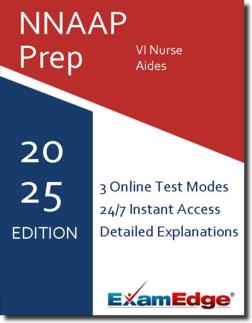NNAAP VI Nurse Aides Practice Tests & Test Prep by Exam Edge - Blogs
Based on 22 Reviews
- Real Exam Simulation: Timed questions and matching content build comfort for your NNAAP VI Nurse Aides test day.
- Instant, 24/7 Access: Web-based NNAAP Virgin Islands Nurse Aides practice exams with no software needed.
- Clear Explanations: Step-by-step answers and explanations for your NNAAP exam to strengthen understanding.
- Boosted Confidence: Reduces anxiety and improves test-taking skills to ace your NNAAP Virgin Islands Nurse Aides .



